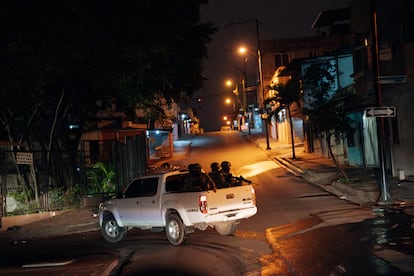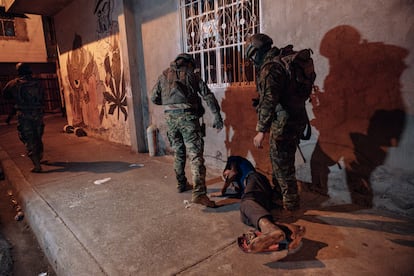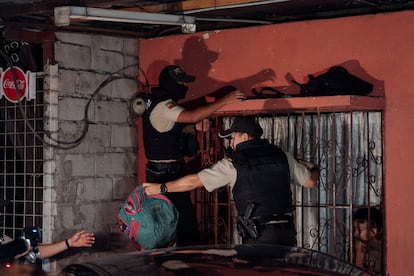The day Goofy lost his hand and Ecuador crumbled
A night on patrol with Ecuadorian soldiers shows a glimpse of the war unleashed in the country between the authorities and the gangs


Everyone liked Goofy. He never hurt anyone. It was unclear who his father was — his alcoholic mother left him alone at home for weeks on end. He became a petty thief who stole shirts from clotheslines, a gas cylinder from a clueless housewife, or a soft drink from the corner store, which he hid in his pants. One day, however, he robbed the wrong person in El Arbolito, a neighborhood in Durán, the municipality with the highest homicide rate in Ecuador.
The gang leader in the area — nicknamed Bob Marley — ordered that Goofy’s right hand be cut off with a machete, at the wrist. Goofy now begs for money from drivers who stop at the traffic lights on a long avenue that leads to Guayaquil, the second-largest city in the country. He shows them his stump through the window.
Bob Marley was arrested in 2020, accused of being behind a wave of murders in El Arbolito. The place is a strategic area for drug trafficking: the river that borders it leads to the sea, where boats set sail to the rest of the world. 60% of global cocaine trafficking passes through here. Criminals in this area have stopped moving by car — they now use motor boats. Ecuadorian gangs — in collaboration with Mexican cartels — have turned El Arbolito into the Amazon of drug exports. The cashflow has made their power grow spectacularly in just three years. The gangs now control prisons, ports, customs and taxi fleets, as well as fruit and fish markets. They’ve managed to infiltrate the police and the army. They have judges and prosecutors on their payroll. Their tentacles have even reached politics, where they have adept mayors and governors doing their bidding. Criminal gangs — almost overnight — threaten to control all the state’s resources.
The last few governments helplessly assisted the expansion of drug-trafficking. Nothing has been able to stop it. The new president — Daniel Noboa — is the 36-year-old son of the richest man in the country. With barely two months in office, he’s declared war on the gangs with an executive order. 22 of these gangs have been classified as terrorist organizations, which has given the army the possibility of confronting them directly. Beyond this, however, Noboa hasn’t shown great leadership — his speeches can be counted on one hand. Nobody understands precisely what plan he has in mind to face the greatest security crisis in the history of his country.

At the moment, the military patrols the streets. Tonight, soldiers — armed to the teeth — have entered La Peca, a neighborhood of low concrete houses criss-crossed with power lines. The moonlight illuminates everything like a lamp. “We know that there are criminal groups in this sector,” says Captain Carlos Riofrío. His men hold their long weapons and click their boots against the asphalt. In their wake, the few who have violated the curfew — which begins at 11 p.m. — take shelter in their homes. They lock the doors and bar the windows. A few peek through the curtains, but they hide as soon as they feel that they’re being watched. With their faces hidden behind balaclavas, the soldiers plunge into the night.
“There, there!” the captain shouts, pointing to a side street.
Four shadows run into the darkness.
The soldiers jump out of the truck and chase them through the neighborhood. Screams and gasps begin to be heard. One of the boys stops running, takes off his shoes and stands against the wall, arms raised. A Heckler & Koch assault rifle is pointed at his chest. His face shows a grimace of terror. Up ahead, a soldier has knocked another person down on the sidewalk, placing his boot on the back of his head and aiming the gun downwards. A third runner throws himself to the ground and surrenders. The last one — fearing death — also gives up.
The soldiers check their arms, backs and chests for tattoos. They want to find drawings of machetes and wolves… proof that they belong to the main gangs, Los Choneros and Los Lobos. The boys have nothing on them — no drugs, no weapons, just a few trinkets they’ve rescued from the trash. Even so, the soldiers place them in patrol cars to check if they have criminal records.
These days, videos of abuses by the authorities have been leaked. In one, they put three boys in a hole and pepper spray them, without letting them come out. It’s one of the tests that soldiers must pass during their military training. One of the concerns of security experts is that the president’s broad approach may lead to human rights violations, as happened in Mexico when Felipe Calderón took the military out of the barracks in 2006, or, more recently, in the case of El Salvador.
“We must annihilate the enemy,” a soldier shrugs, as he continues the search for gang members tonight.
Two very thin boys — both wearing caps — are hiding between some cars. You can see them with the naked eye… you don’t have to be very clever to spot them. The soldiers subdue them in an instant, throwing them up against the hood of the patrol car and searching them. They’re also not carrying anything of importance. A neighbor — upon observing the scene — dares to step out of his house and shouts at the boys: “You two wouldn’t even make it as criminals!”
The resident says that the two youngsters are addicted to drugs. He’s fed up with them, because they wander around the neighborhood to see what they can get. The soldiers let them go and they walk away while pulling up their pants, looking like they’ve crossed paths with the devil. In the following hours, the military convoy will come across prostitutes, beggars, people suffering from mental illnesses, drunks and idlers who aren’t afraid of death. Nobody will be getting a medal for this.
This past week, the government announced that — as it tries to regain control of the nation — the authorities have arrested 1,105 people, dismantled 28 “terrorist cells,” freed 56 kidnapped people and detained 27 escaped prisoners. Two police officers and five alleged criminals have died along the way, according to the official data.
A power forged in prisons
The power of the gangs — although it sounds counterintuitive — was forged in the prisons. President Rafael Correa (2007-2017) toughened the penal code and multiplied the prison population by four, from 10,000 to 40,000 inmates. His administration drastically reduced homicides. Ecuador was a security bubble in the middle of two countries as violent as Peru and Colombia. However, under the radar, the expansion of the gangs — and their recruitment in prisons — was incubated. Young men — sentenced to prison for dealing drugs or abusing women — had to join gangs as a means of survival. Not doing so meant putting a noose around your neck.
At first, Los Choneros dominated, as they had a charismatic leader: Jorge Luis Zambrano, alias Rasquiña. Various criminal groups, such as the Chone Killers, the Tiguerones — former jailers who went into the underworld — Los Lobos and Los Lagartos answered to Rasquiña, until he was murdered in December of 2020. This event marked a before and after.
The gangs subsequently broke up and began to fight each other for supremacy. Prison riots took place. In 2021, in a prison in Guayaquil, more than 100 prisoners were murdered with knives and machetes. Those who won beheaded the losers and threw their heads into the toilets. One of them had his chest opened, his heart taken out and bitten while it was still beating. The guards — complicit because of bribery, or simply inept — watched the massacre without being able to do anything.

The day of the riot — when madness reigned — a boy from a non-marginal background tried to make himself invisible, so that nobody would notice his presence. He had been imprisoned months before for illicit association — a fabricated crime, which was used to remove him from his role as one of the student leaders in the protests against Guillermo Lasso. The former president let crime grow like an ivy during his two-and-a-half years in office (2021-2023). Carlos (a pseudonym) entered the Guayaquil prison in the dark, without knowing what he was going to find. His mother — a lawyer — was working to free him. On the first day, he was told that he had to pay $80 a week for protection and access to a bed and food. If he didn’t do it, he would end up in El Hoyo, the punishment cell, where the poor, the crippled and the homeless are crowded together without a bathroom.
Carlos paid… but those who don’t have the funds end up enslaved by the leaders of the pavilions. They wash clothes, clean rooms, cook and serve as sexual objects. Only the poorest boys who kill without regard — those who become hitmen — are saved from such a fate. The prisons are full of inmates who’ve served more than 60% of their sentence, which should grant them freedom. However, due to the corrupt bureaucratic system that surrounds the process, it’s very difficult to exit. 90% of those who’ve exceeded that time period don’t manage to leave — they remain in limbo. They need to prove that they haven’t committed any other offense, pass a psychological report, prove that they’ve attended academic or technical courses while incarcerated and present a document — signed before a notary — from a family member or friend, who assures the authorities that they’ll provide a roof for them upon their release.
In practice, these workshops don’t exist. Psychological tests have to be falsified, because none are administered. And, if the judges’ secretaries don’t receive their bribes, they won’t set a date for a release hearing. Practically everyone who sees the light of day gets it by extorting or bribing some official. Carlos — who is now free and wearing a suit — is dedicated to helping several prisoners overcome this process.
The government has recovered some of the most violent prisons in the country, such as those in Guayaquil. But this has happened in the past — the gangs have simply returned to rule over them again. The population’s fear is that, after this period of turmoil, everything will return to normal… that is, to the rule of the gangs. The cartels have become deeply-rooted in Ecuador, like they are in Mexico, where crime has become part of the landscape.
One of the soldiers — his face hidden behind a balaclava, his assault rifle raised — sums up their existence: “Either we kill them, or they kill us. There’s no other option.”
Sign up for our weekly newsletter to get more English-language news coverage from EL PAÍS USA Edition
Tu suscripción se está usando en otro dispositivo
¿Quieres añadir otro usuario a tu suscripción?
Si continúas leyendo en este dispositivo, no se podrá leer en el otro.
FlechaTu suscripción se está usando en otro dispositivo y solo puedes acceder a EL PAÍS desde un dispositivo a la vez.
Si quieres compartir tu cuenta, cambia tu suscripción a la modalidad Premium, así podrás añadir otro usuario. Cada uno accederá con su propia cuenta de email, lo que os permitirá personalizar vuestra experiencia en EL PAÍS.
¿Tienes una suscripción de empresa? Accede aquí para contratar más cuentas.
En el caso de no saber quién está usando tu cuenta, te recomendamos cambiar tu contraseña aquí.
Si decides continuar compartiendo tu cuenta, este mensaje se mostrará en tu dispositivo y en el de la otra persona que está usando tu cuenta de forma indefinida, afectando a tu experiencia de lectura. Puedes consultar aquí los términos y condiciones de la suscripción digital.








































